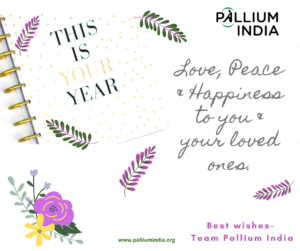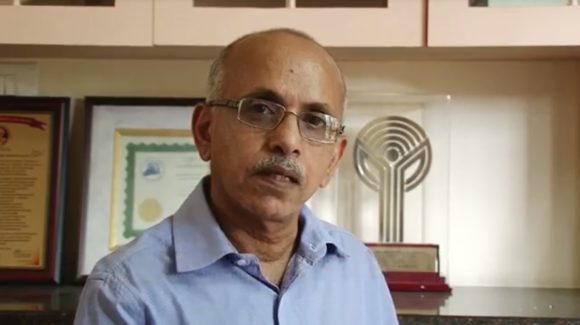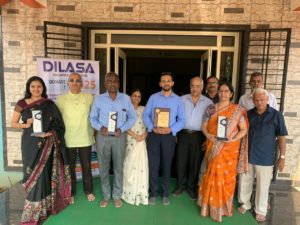January 2020
Dear friends,
 This past year saw Pallium India traverse many a new territory, encounter several challenges and partner with incredible people, organizations and communities. It also brought with it many changes in the right direction.
This past year saw Pallium India traverse many a new territory, encounter several challenges and partner with incredible people, organizations and communities. It also brought with it many changes in the right direction.
The first was a revolutionary change brought about by the Medical Council of India (MCI) by including most aspects of palliative care in undergraduate medical education, beginning with the batch starting in 2019. A cause for celebration no doubt, but for this inclusion to have any real meaning – to be truly incorporated and taught – may take many years, and we are committed to trying to make that happen. Another heartwarming and vitally necessary step has been the MCI’s move to update the MBBS curriculum to include disability rights and dignity.
Things have been moving along in various states. Closer to headquarters – the Kerala palliative care policy was in its 9th year and has had a significant impact. Pain management in Kerala, when we recently checked, was 15 times higher than India’s national average. That sounds like a great deal, doesn’t it? The disappointing truth is that it is only 1/5-th of the global average. When further compared to Western European countries where they have achieved a semblance of balance between access to opioids for people in pain and the prevention of abuse, we are at an abysmal 1/150-th of what they achieve.
We found a wonderful ally in Kerala’s Health Minister Smt. K K Shailaja Teacher, who immediately took up a request from Pallium India to review and revise the state palliative care policy. A committee was convened under the able chairmanship of S.M.Vijayanand IAS, the former Chief Secretary of Kerala. It worked hard to create the revised policy, and rather serendipitously, almost poetically even, the revised policy was declared a day ahead of Universal Health Coverage Day. We now eagerly await progress on the implementation framework that is yet to be created.
Good news has also been coming in from various parts of India. Andhra Pradesh has made significant progress with at least one new palliative care program started and many more in the offing. A group of nurses and doctors getting trained in Uttar Pradesh was another milestone. Thanks to the enthusiasm of Prabodh Saxena IAS and the dynamism of Dr. Gopal Chauhan, eleven keen doctors from Himachal Pradesh attended our foundation course. In Haryana, we successfully conducted a 10-day foundation course attended by medical officers and staff nurses. A series of trainings and other events were organized in the North East, attended by our dear friend Gilly Burn. In Odisha, Chief Minister Naveen Patnaik himself announced district-level palliative care program for the state, based on a draft document that Pallium India prepared. Meanwhile, Telengana government initiated a state-wide palliative care activity, and Tamil Nadu has declared the state policy for palliative care.
This is not all. We have much to smile about. Read more about The Year That Was ->
–
IAPCON 2020
 The 27th international conference of the Indian Association of palliative care is scheduled to take place at Guwahati, Assam from 14-16 February 2020, with pre-conference workshops on February 13th.
The 27th international conference of the Indian Association of palliative care is scheduled to take place at Guwahati, Assam from 14-16 February 2020, with pre-conference workshops on February 13th.
Dr Dinesh Goswami chairs the organising committee with Dr Arun Deka as organising secretary, Dr Sushma Bhatnagar chairing the scientific committee and Dr Sanghamitra Bora co-chairing it.
Click to register and to book your accommodation.
Though recent political disturbances had cast a shadow, we have confirmation from the organizers that Guwahati is peaceful now and that the conference will happen as planned.
–
India should get back to stay on Dr Anne Merriman’s path.
It is a constant struggle. Opium is grown in India and morphine should be available at low cost for those in pain. But that of course would not suit the Industry.
Fortunate indeed that in the 1990s, Ms Gilly Burn, the British nurse got Dr Yusuf Hamied of Cipla Pharmaceuticals interested in the matter, and we started getting inexpensive morphine.
Unfortunately, in recent years, Cipla stopped producing morphine. Competitors who sell it at five times the cost have taken over. In Kerala, so far we have been OK because, thanks to the initiative of the then drugs controller Mr Venkatakrishnan in the 1990s, Lisie Hospital Pharmaceuticals started giving (and still gives) us inexpensive immediate release morphine. But this fragile arrangement is under constant threat. Often technicalities are brought in so as to stop their production somehow.
Obviously indigenous low-cost morphine production is something we must nurture. Please read about the Rwandan experience that is built on Dr Anne Merriman’s experiment in Uganda which spread over Sub-Saharan Africa. Rwanda avoids US-style opioids crisis by making own morphine
We should all be asking the question that kept Dr. Christian Ntizimira sleepless. “Why study so many years if I can’t help someone in pain?”
–
Caution about gabapentin and pregabalin:
The U.S. Food and Drug Administration (FDA) warns of possible serious breathing difficulties in patients using gabapentin or pregabalin in the presence of respiratory risk factors. These include old age, concurrent use of opioid pain medicines, and chronic obstructive pulmonary disease (COPD).
Please read: FDA warns about serious breathing problems with seizure and nerve pain medicines gabapentin and pregabalin
It is important to note that the 2019 WHO guidelines for cancer pain do not recommend gabapentinoids, saying, “While gabapentin has been widely prescribed, in 2017 it was rejected for inclusion in the WHO Model list of essential medicines on account of fraudulent evidence.”
–
Congratulations Esther Munyoro!
We are so very glad to see that Dr Esther Munyoro has been awarded “The Order of the Grand Warrior” by the President of Kenya “in recognition of outstanding or distinguished services rendered to the nation in various capacities and responsibilities”. Congratulations, Dr Esther Munyoro!
A long time back, we had published Esther’s comments on lack of pain relief in India. Please read: Health tourism in India – why no pain relief?
–
Here is why palliative care for humanitarian crisis is so important.
Are we doing enough for migrants, refugees, people who have fled war-torn zones and for those in natural disasters?
Please read: Palliative care as a basic healthcare right: A new consensus within the humanitarian community
–
Thank you for promising to be there for me even if in your eyes I am a sinner, Archbishop Paglia.
Dr M. R. Rajagopal, Chairman of Pallium India, writes:
 Most of us in palliative care do not justify euthanasia, whether or not you call it assisted suicide. We believe that every request for assisted suicide is a call for help, “I cannot bear this suffering. Make my life liveable.”
Most of us in palliative care do not justify euthanasia, whether or not you call it assisted suicide. We believe that every request for assisted suicide is a call for help, “I cannot bear this suffering. Make my life liveable.”
If I am in that sick bed crying out to someone to kill me, I know many will add to my suffering by preaching ideology and by adding to my emotional burden. If in my pain and agony, I take a decision that is sin by their ideology and belief systems, and yet in my last minutes I call out for help, those who made the speeches may walk away from me. But I know Jesus would not have. And I know you would not, Archbishop Paglia.
That simple message, “I will not abandon you whatever be the circumstance”; is the ultimate message of love and peace. Thank you for being in this world.
Read: Debate over Vatican official’s assisted suicide remark driven more by ideology than reality
–
3-day Training on End of Life Nursing – Pediatrics
Cipla Palliative Care and Training Centre is organizing a three-day certificate training program for nurses.
Venue: Bai Jerbai Wadia Hospital for Children, Parel, Mumbai
Date: 6, 7 & 8 January 2020
Click here to register for the program
Contact
Dr Veronique Dinand – 9971839244 | Brother Ashish Telgote – 9870623954 | Sister Poonam Subhedar – 9833548056
–
Video of the Month: Symptom Management in Palliative Care – Dyspnoea
Symptom Management in Palliative Care – Dyspnoea
Watch the video: Symptom Management in Palliative Care – Dyspnoea
For more videos, please subscribe to Pallium India’s youtube channel: https://www.youtube.com/channel/UCTNWffD5VtKBstQ1jCN8aBQ
–
Vacancy: Palliative care physician at Snehaanchal, Nagpur
Snehaanchal Hospice and Palliative Care Centre, Nagpur, invites applications to the post of Palliative Care Physician (full time).
Eligibility: M.B.B.S, with formal training or qualification in Palliative Medicine
Experience: 3 to 5 years in a palliative set-up is necessary
For more information about the job, please click here
Application, together with a self-drafted CV or Resume, can be emailed to [email protected] marking the Subject with words “PHYSICIAN PALL CARE”. Applicant must clearly spell out his/her financial and non-financial expectations, if any.
–
Donate to Pallium India
 The money you give will pay for essential free medicines for the poor, for their travel to the clinic or for schooling of their children, or other forms of care.
The money you give will pay for essential free medicines for the poor, for their travel to the clinic or for schooling of their children, or other forms of care.
Please give whatever you can. No amount is too small.
To donate, please visit:
https://palliumindia.org/donate/ (India)
http://palliumindiausa.org/ (USA)
Write to us: [email protected]
Call us: +91-9746745497 (India) / +1-718-273-8597 (USA)
All donations to Pallium India are tax deductible.
–
Upcoming Events
- Jan 1, 2020: Clinical Fellowship in Pediatric Palliative Medicine at MNJ Institute of Oncology, Hyderabad. Contact: [email protected]
- Feb 14-16, 2020: IAPCON Guwahati
- Mar 2, 2020: Certificate Course in Pain and Palliative Medicine (for doctors) and Certificate Course in Palliative Nursing (for nurses) at Trivandrum. CCPPM: https://palliumindia.live-website.com/courses/ccppm/ CCPN: https://palliumindia.live-website.com/courses/ccpn/ Contact: +91 8589998760 / [email protected]
- Mar 2, 2020: Advanced Certificate Course in Pediatric Palliative Care at MNJ Institute of Oncology, Hyderabad. Contact: [email protected]
- May 4, 2020: 10 day Foundation course for doctors (FCPPM) at Trivandrum. Contact: +91 8589998760 / [email protected]
- Jun 1, 2020: Certificate Course in Pain and Palliative Medicine (for doctors) and Certificate Course in Palliative Nursing (for nurses) at Trivandrum. CCPPM: https://palliumindia.live-website.com/courses/ccppm/ CCPN: https://palliumindia.live-website.com/courses/ccpn/ Contact: +91 8589998760 / [email protected]
- Jul 1, 2020: Clinical Fellowship in Pediatric Palliative Medicine at MNJ Institute of Oncology, Hyderabad. Contact: [email protected]
Have Queries? Write to: [email protected].
Find out more about our courses at: https://palliumindia.org/courses/
–
Why do young doctors take up palliative care?
Dr M. R. Rajagopal, Chairman of Pallium India, writes:
I met these two young doctors at the Annual conference of Association of Radiation Oncologists of India (AROICON 2019) – Dr Mayur Ghoghari and Dr Kikato Chishi – both belonging to the first batch of doctors joining the MD course in Palliative Medicine at GCRI, Ahmedabad, Gujarat. Mayur wearing red and Kikato in black.
Mayur had one life-changing experience at the age of four. His mother died of cancer. In pain. He lives with those painful memories.
Kikato hails from Nagaland. He happened to hear one lecture which changed his life. He heard Gilly Burn.
 Gilly Burn is the phenomenon that has inspired at least two generations in India with her advocacy for palliative care. I personally remember listening to her in 1992 talking about treating breathlessness with morphine – for which until then was taught breathlessness was an absolute contraindication! For the last couple of years, she is working with Pallium India on palliative care advocacy focusing on medical and nursing students in various parts of India. North, South, East, West – Gilly has been everywhere.
Gilly Burn is the phenomenon that has inspired at least two generations in India with her advocacy for palliative care. I personally remember listening to her in 1992 talking about treating breathlessness with morphine – for which until then was taught breathlessness was an absolute contraindication! For the last couple of years, she is working with Pallium India on palliative care advocacy focusing on medical and nursing students in various parts of India. North, South, East, West – Gilly has been everywhere.
And Dr Kikato Chishi is living proof of the power of her words. Can you see the cascade effect? One talk, yes, is only one talk. But the end result is the magical relief from pain and suffering for thousands in future.
Best wishes, Mayur and Kikato. May you wipe many a tear! And live with satisfaction, if not with great luxuries.
Thank you Gilly, for all that you have done for India. The power of your sincerity, words and deeds have scooped away a huge chunk of suffering in our country.
–
Dilasa on fast-forward mode in Goa!
It is only eight months since we reported on Dilasa Palliative care centre in Goa.
It was very good to revisit them. In a short period of time it has grown from strength to strength.
We are not surprised that the Indian Medical Association (IMA) has given this program its national award for the best community-oriented project of IMA. Pallium India is proud to work with you on this journey, all at Dilasa.
–
We’re all in this together
Nincy Mariam Mondly, Pallium India’s friend and a wheelchair user, writes on the International Day of Persons with Disabilities:
 Let us bring to light how our lives as persons with disabilities continue to be lived – NOT to the fullest. While we are, for better or worse, inevitably different from the usual crowd, our dreams and desires refuse to be caged by the limits set by our bodies.
Let us bring to light how our lives as persons with disabilities continue to be lived – NOT to the fullest. While we are, for better or worse, inevitably different from the usual crowd, our dreams and desires refuse to be caged by the limits set by our bodies.
Goals to improve the quality of lives of people like us are loaded with adjectives like ‘inclusive’, ‘integrative’, ‘equitable’ and such. But how often do you see a wheelchair-bound person in a public place? Clearly what is on paper hasn’t been put to practice.
What connects the bits that make up the whole of a common man’s life is lacking for persons with disabilities. That is to say, if the common man/woman has or can find means to connect his/her health, home, education, workplace and much more in life, it is not so for persons with disabilities. For, even if the right to education may exist, he/she may not be able to pursue it because there is no affordable and available means of regular public transport. As for job opportunities, to go beyond ‘making a living’ to ‘loving your work’ seems more utopian for people like us than everyone else. The same walls that confine us can often comfort us a bit too much that we lose the courage to fight for the rights that remain in books.
And if we were to strive for the implementation of these rights, who would lead us? Because we are unable even to reach out to each other, let alone to the general public.
All of us, labelled either ‘well-abled’ or ‘disabled’, partake in the sunlight that falls over us and the air that we breathe. If a flood comes to kill, it can kill us all. We together form this society and if we were to join hands to uplift each other, it would be just like holding tight the baton and running the best race we can. For the relay we are, is best played together.
–
Join Us on Social Media
Pallium India’s Facebook page has over 9000 likes. We regularly post articles related to palliative care from around the world. Click here to Like our page!
Follow us on Twitter: @palliumindia and Instagram: @palliumindia
–
PARTING SHOT
Let us share something that we overheard at a pain conference organized by Kerala Chapter for Indian Society for Study of Pain. Dr G P Dureja, a well-known pain physician based in Delhi exhorted all the attendees, “Don’t become an interventional pain physician. Become a pain physician.”
Powerful message indeed.
Dr Jan Stjernswärd used to quote, “When you have a hammer, everything looks like a nail.”
Pain management (or management of any medical issue, for that matter) should not be based only on what we have in our armamentarium; it should be based on whatever the person needs. For the interventionist, the support of a counsellor or somebody who is familiar with pharmacotherapy can be valuable, if the focus is to get optimal relief for the suffering person.
—













best wishes pallium india. and our beloved rajagopal sir